Continuous learning & continuous updating
Keep breaking away
Multi table relation
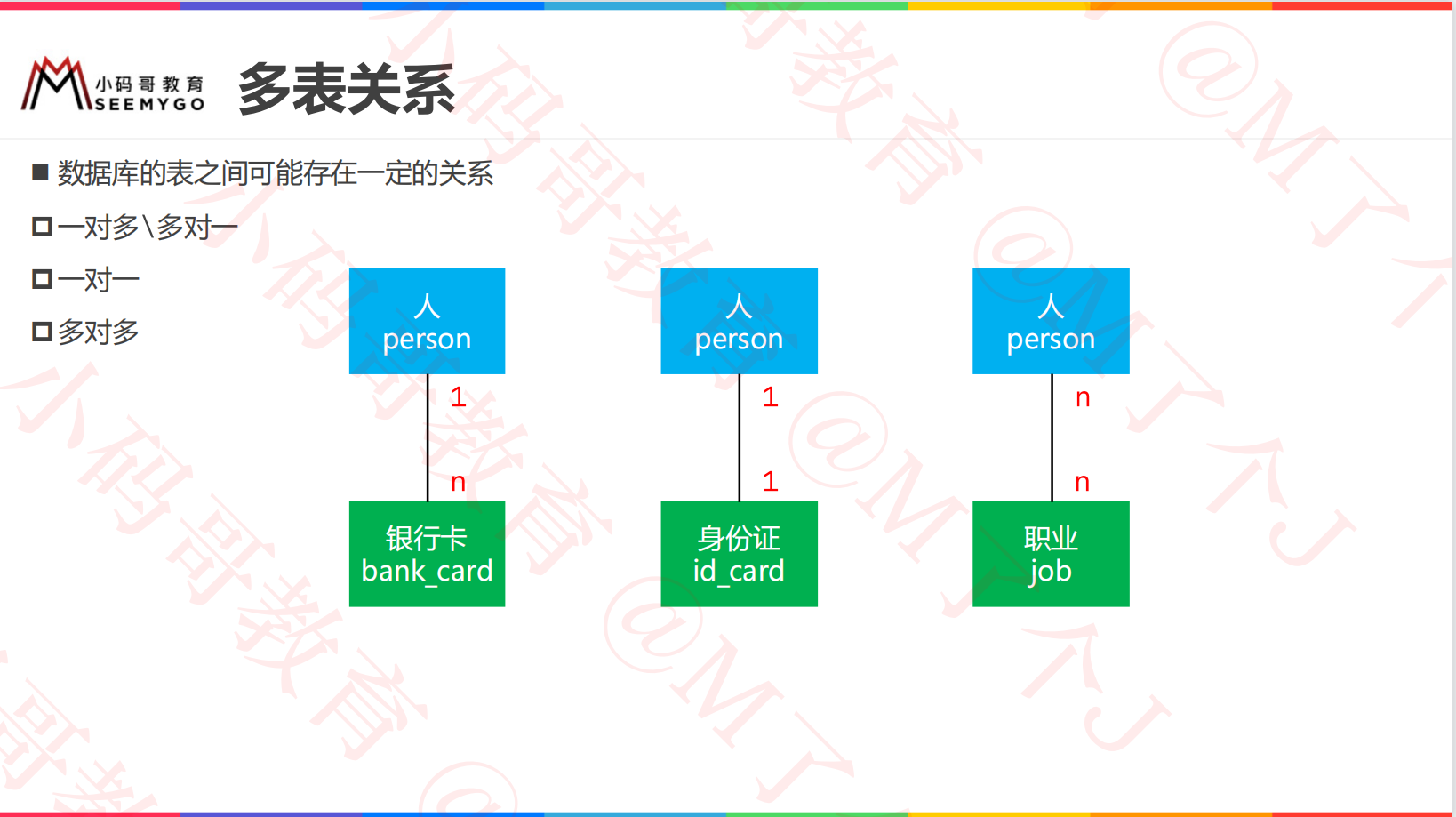
-
There are two perspectives when thinking about the relationship between the two tables:
- Think about table B from table A (see table A as an A)
- Think about table A from table B (see table B as A b)
-
That is:
- Look at table B from an A
- Start from A B and look at table A
-
Such as personal statement and bank card statement
- From the perspective of people: a person can have multiple bank cards
- From the perspective of bank card: a bank card can only be owned by one person
-
Such as person table and ID card table
- From the perspective of people: a person can only have one ID card
- From the perspective of ID card: an ID card can only belong to one person
-
For example, people table and work (occupation) table
- From the perspective of people: a person can have multiple jobs (multiple occupations)
- From the perspective of work (occupation): a job (occupation) must have multiple practitioners
Multi table relationship - 1 to n \ n to 1
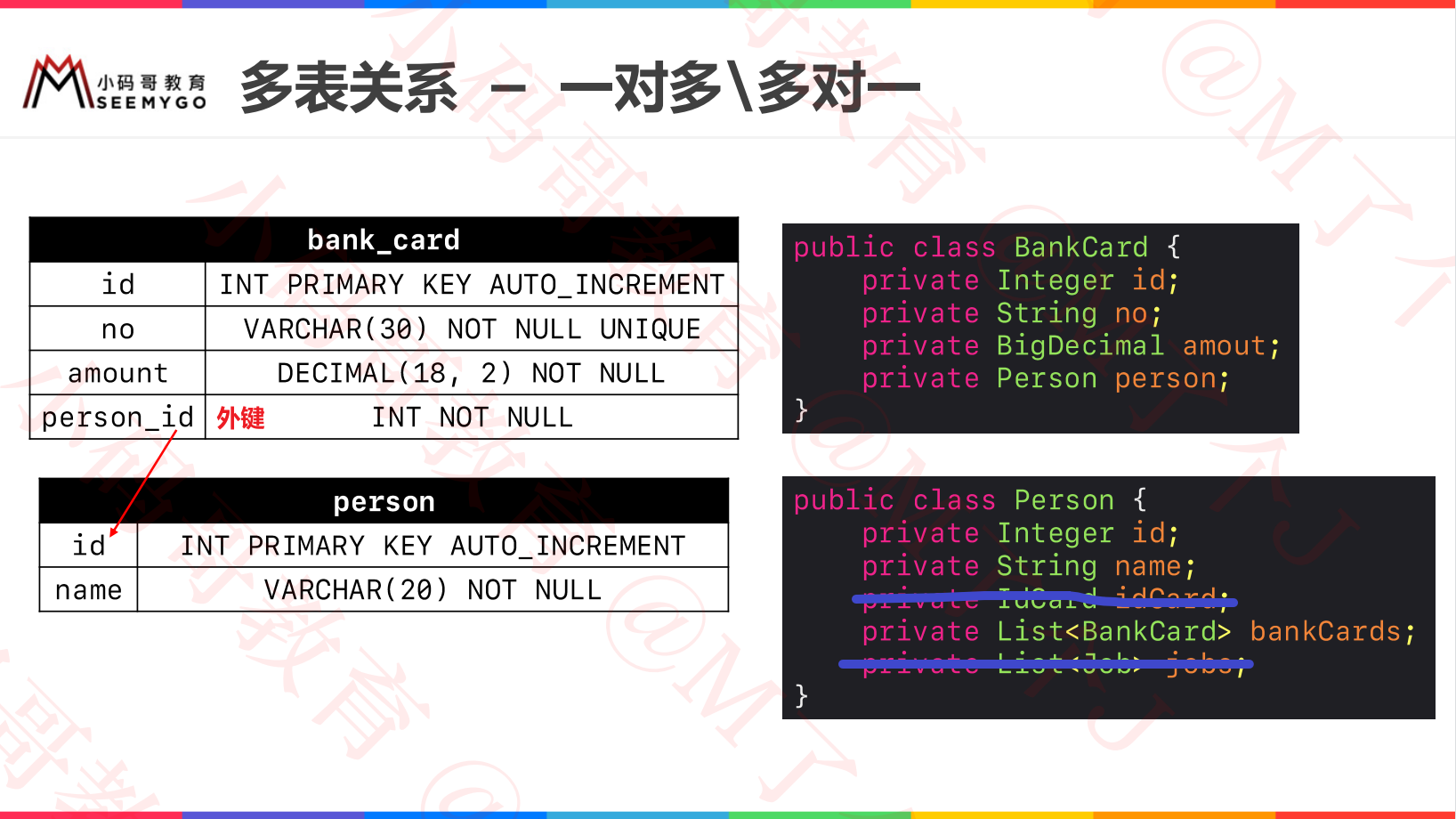
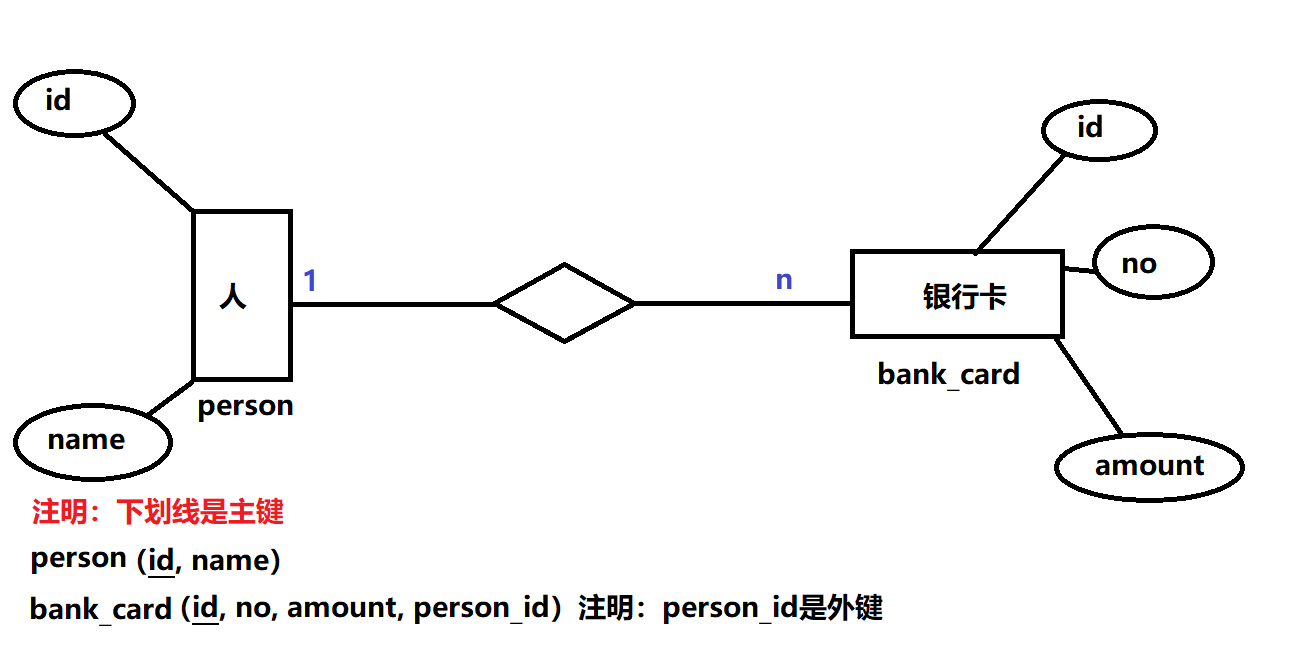
Multi table relationship - 1 to 1
-
In the 1-to-1 relationship, foreign keys can be written in any table, but they must be UNIQUE
-
UNIQUE means that the values in a column in a table cannot be repeated and must be UNIQUE.
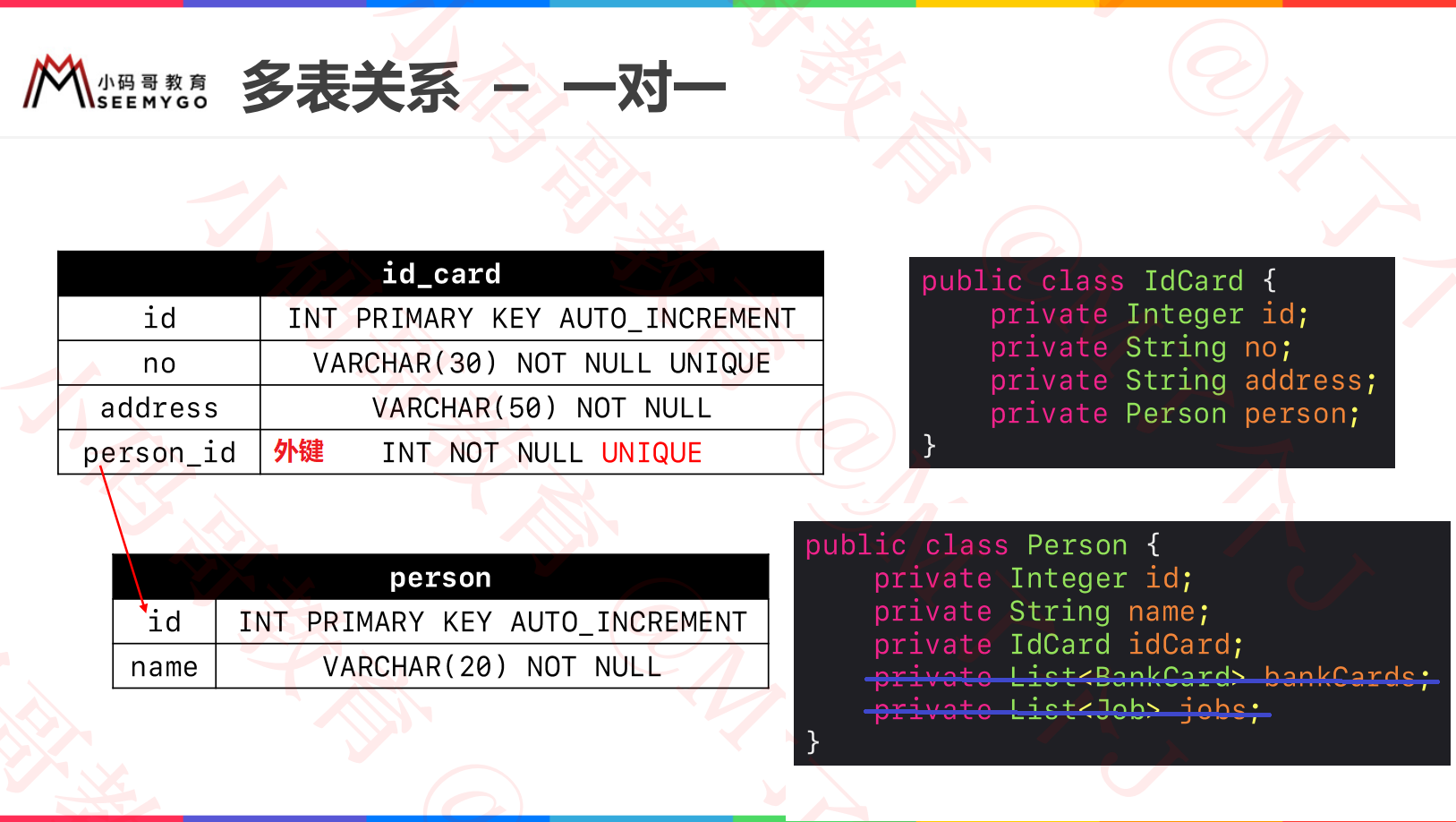
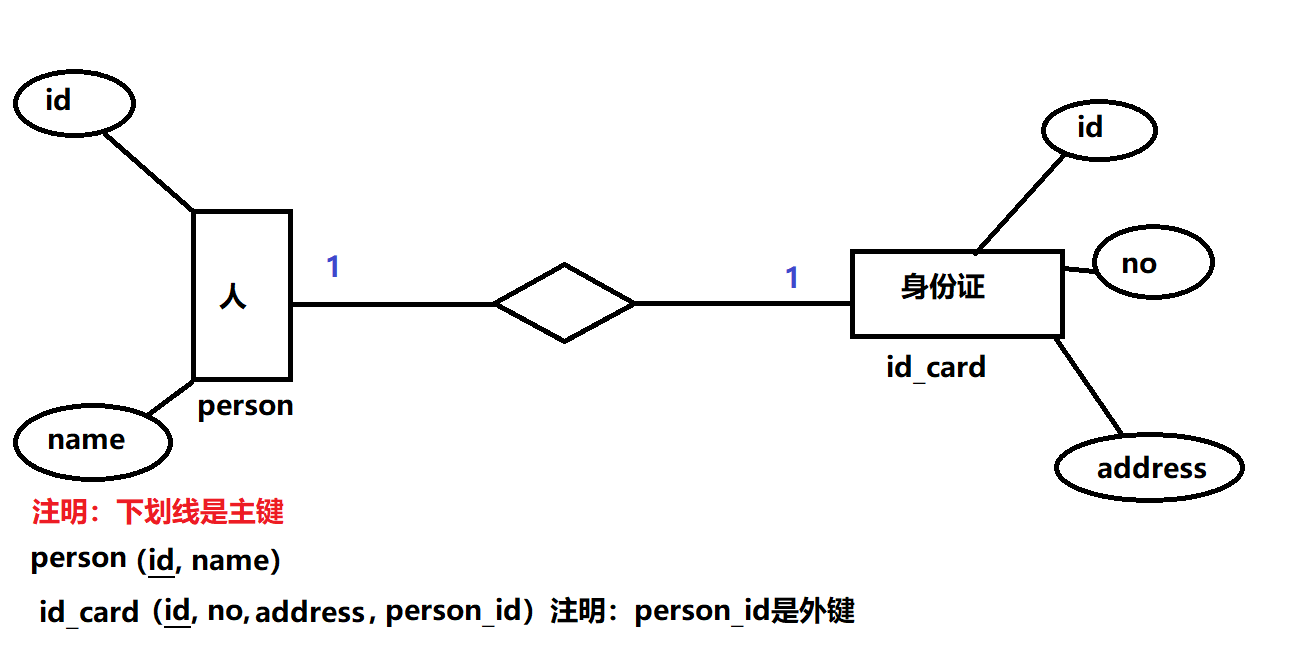
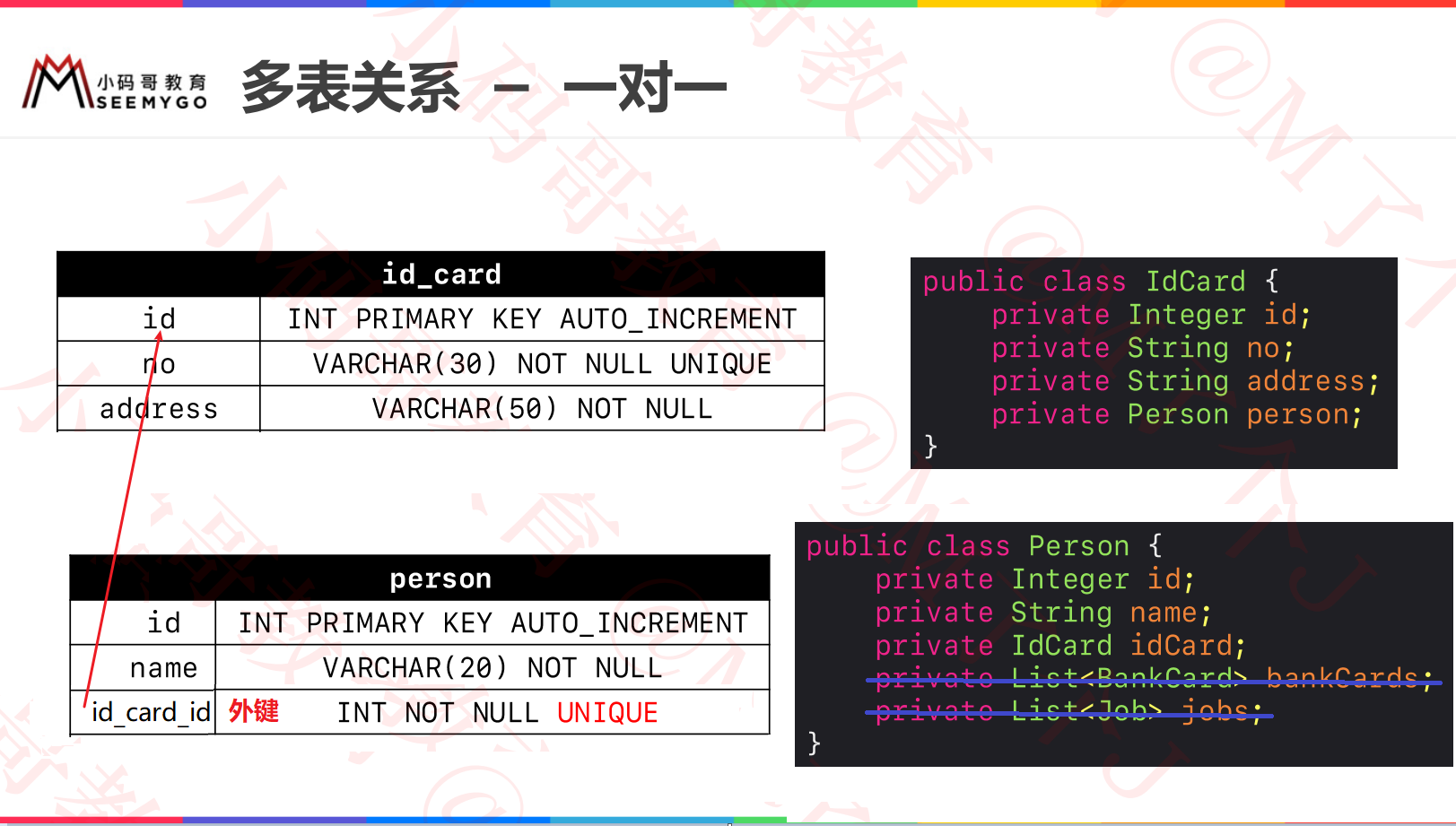
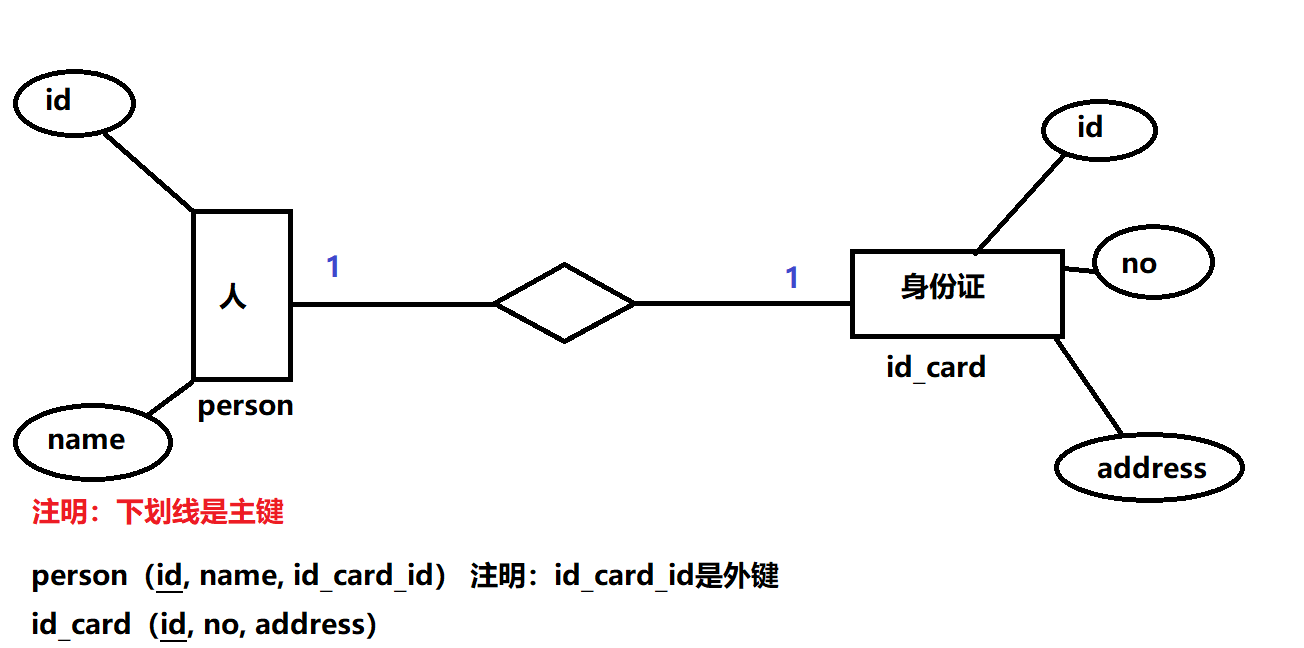
Multi table relationship - n to n
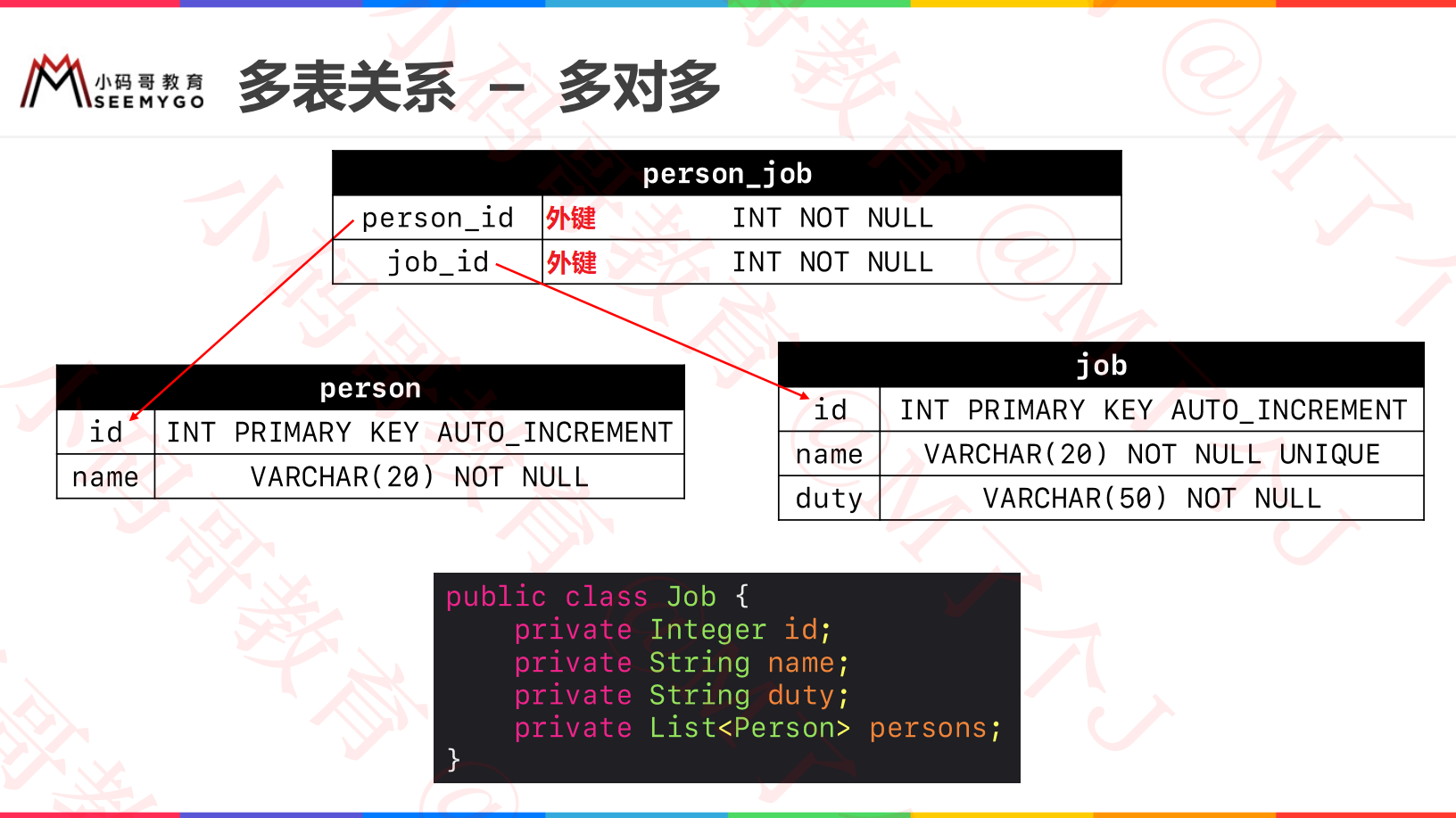
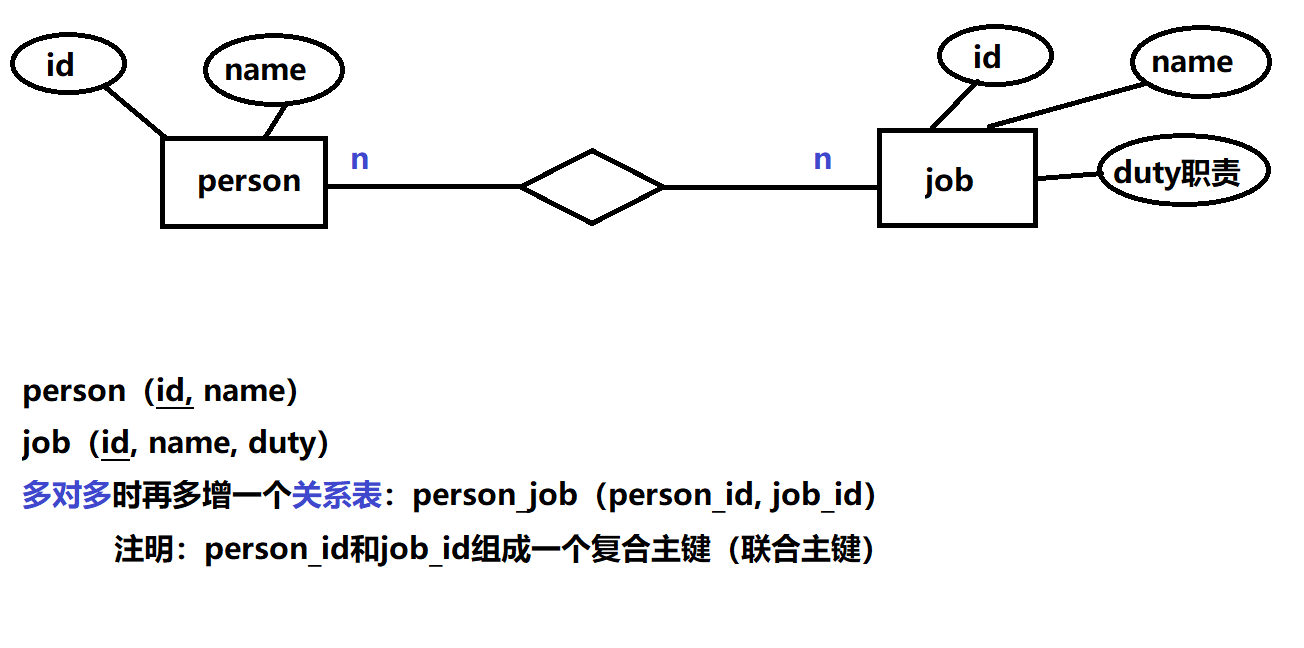
Create table SQL
# person
CREATE TABLE person(
id INT PRIMARY KEY AUTO_INCREMENT,
name VARCHAR(20) NOT NULL
);
# bank_card
CREATE TABLE bank_card(
id INT PRIMARY KEY AUTO_INCREMENT,
no VARCHAR(30) NOT NULL UNIQUE,
amout DECIMAL(18, 2) NOT NULL,
person_id INT NOT NULL,
FOREIGN KEY (person_id) REFERENCES person(id)
);
# id_card
CREATE TABLE id_card(
id INT PRIMARY KEY AUTO_INCREMENT,
no VARCHAR(30) NOT NULL UNIQUE,
address VARCHAR(50) NOT NULL,
person_id INT NOT NULL UNIQUE,
FOREIGN KEY (person_id) REFERENCES person(id)
);
# job
CREATE TABLE job(
id INT PRIMARY KEY AUTO_INCREMENT,
name VARCHAR(20) NOT NULL UNIQUE,
duty VARCHAR(50) NOT NULL
);
# person_job
CREATE TABLE person_job(
person_id INT,
job_id INT,
PRIMARY KEY (person_id, job_id),
FOREIGN KEY (person_id) REFERENCES person(id),
FOREIGN KEY (job_id) REFERENCES job(id)
);
# data
INSERT INTO person(name) VALUES ('Jack'), ('Rose'), ('Larry'), ('Mike'), ('Tom'), ('James');
INSERT INTO id_card(no, address, person_id) VALUES
('9527', 'Beijing', 4),
('8866', 'Guangzhou', 1),
('2495', 'Shanghai', 5),
('4378', 'Chengdu', 2),
('5454', 'Hangzhou', 6),
('9923', 'Shenzhen', 3);
INSERT INTO bank_card(no, amout, person_id) VALUES
('6223', 0, 1),
('75556', 2098.56, 2),
('5345', 1010000.56, 1),
('87876', 534423.34, 3),
('654645', 432.45, 1),
('5434534', 234765.19, 4),
('76853', 98945.39, 4),
('6456867', 435534.78, 1),
('4324654', 874343.99, 4),
('53455', 5.20, 2);
INSERT INTO job(name, duty) VALUES
('programmer', 'Writing new books every day bug And modify yesterday's bug'),
('security staff', 'Company wide physical security specialist'),
('Network management', 'Tutor of information integration and application of world Internet information terminal and Human Information Technology Department'),
('cook', 'Head of class oral nerve endings induction experimental center and green environmental protection mail fertilizer conversion processing base'),
('Film', 'Surface treatment of intelligent high-end mobile devices'),
('Brick moving', 'Rectangular concrete instantaneous movement'),
('fortune-telling', 'Subjective logical inference and psychological guidance'),
('barber', 'Main knife for removal of useless human accessory tissues');
INSERT INTO person_job(person_id, job_id) VALUES
(1, 1),
(1, 3),
(1, 5),
(1, 7),
(2, 5),
(3, 1),
(3, 2),
(5, 3),
(5, 5),
(5, 7);
code
Bean
- Person:
public class Person {
private Integer id;
private String name;
private IdCard idCard; // A person can only have one ID card
private List<BankCard> bankCards; // A person can have multiple bank cards
private List<Job> jobs; // A person can have more than one job (part-time is also a job)
// ... getter setter ...
}
- IdCard:
public class IdCard {
private Integer id;
private String no;
private String address;
private Person person; // An ID card belongs to only one person
// ... getter setter ...
}
- BankCard:
public class BankCard {
private Integer id;
private String no;
private BigDecimal amout;
private Person person; // A bank card belongs to only one person
// ... getter setter ...
}
- Job:
public class Job {
private Integer id;
private String name;
private String duty;
private List<Person> persons; // A job (occupation) will have many practitioners
// ... getter setter ...
}
1 to 1
Query Person:
<?xml version="1.0" encoding="UTF-8" ?>
<!DOCTYPE mapper
PUBLIC "-//mybatis.org//DTD Mapper 3.0//EN"
"http://mybatis.org/dtd/mybatis-3-mapper.dtd">
<mapper namespace="person">
<sql id="sqlListAll">
SELECT person.id person_id,
person.name person_name,
id_card.id id_card_id,
id_card.no id_card_no,
id_card.address id_card_address
FROM person JOIN id_card
ON person.id = id_card.person_id
</sql>
<resultMap id="rmList" type="Person">
<id property="id" column="person_id"/>
<result property="name" column="person_name"/>
<association property="idCard" javaType="IdCard">
<id property="id" column="id_card_id"/>
<result property="no" column="id_card_no"/>
<result property="address" column="id_card_address"/>
</association>
</resultMap>
<select id="list" resultMap="rmList">
<include refid="sqlListAll"/>
</select>
<select id="get" resultMap="rmList">
<include refid="sqlListAll"/> WHERE person.id = #{id}
</select>
</mapper>
public static void main(String[] args) {
try (SqlSession session = new SqlSessionFactoryBuilder().build(Resources.getResourceAsReader("mybatis-config.xml")).openSession()) {
List<Person> lists = session.selectList("person.list");
Person person = session.selectOne("person.get", 2);
System.out.println(lists);
System.out.println(person);
} catch (Exception e) {
e.printStackTrace();
}
}
Query IdCard:
<?xml version="1.0" encoding="UTF-8" ?>
<!DOCTYPE mapper
PUBLIC "-//mybatis.org//DTD Mapper 3.0//EN"
"http://mybatis.org/dtd/mybatis-3-mapper.dtd">
<mapper namespace="id_card">
<sql id="sqlListAll">
SELECT id_card.id id_card_id,
id_card.no id_card_no,
id_card.address id_card_address,
person.id person_id,
person.name person_name
FROM id_card JOIN person
ON id_card.person_id = person.id
</sql>
<resultMap id="rmList" type="IdCard">
<id property="id" column="id_card_id"/>
<result property="no" column="id_card_no"/>
<result property="address" column="id_card_address"/>
<association property="person" javaType="Person">
<id property="id" column="person_id"/>
<result property="name" column="person_name"/>
</association>
</resultMap>
<select id="list" resultMap="rmList">
<include refid="sqlListAll"/>
</select>
<select id="get" resultMap="rmList">
<include refid="sqlListAll"/> WHERE id_card.id = #{id}
</select>
</mapper>
public static void main(String[] args) {
try (SqlSession session = new SqlSessionFactoryBuilder().build(Resources.getResourceAsReader("mybatis-config.xml")).openSession()) {
List<IdCard> lists = session.selectList("id_card.list");
IdCard idCard = session.selectOne("id_card.get", 6);
System.out.println(lists);
System.out.println(idCard);
} catch (Exception e) {
e.printStackTrace();
}
}
1 to n \ n to 1
Query BankCard:
<mapper namespace="bank_card">
<sql id="sqlListAll">
SELECT bank_card.id bank_card_id,
bank_card.no bank_card_no,
bank_card.amout bank_card_amout,
person.id person_id,
person.name person_name
FROM bank_card LEFT JOIN person
ON bank_card.person_id = person.id
</sql>
<resultMap id="rmBankCard" type="BankCard">
<id property="id" column="bank_card_id"/>
<result property="no" column="bank_card_no"/>
<result property="amout" column="bank_card_amout"/>
<association property="person" javaType="Person">
<id property="id" column="person_id"/>
<result property="name" column="person_name"/>
</association>
</resultMap>
<select id="list" resultMap="rmBankCard">
<include refid="sqlListAll"/>
</select>
<select id="get" parameterType="Int" resultMap="rmBankCard">
<include refid="sqlListAll"/> WHERE bank_card.id = #{id}
</select>
</mapper>
public static void main(String[] args) {
try (SqlSession session = MyBatises.openSession()) {
List<BankCard> lists = session.selectList("bank_card.list");
BankCard bankCard = session.selectOne("bank_card.get", 3);
System.out.println(lists);
System.out.println(bankCard);
}
}
Query Person:
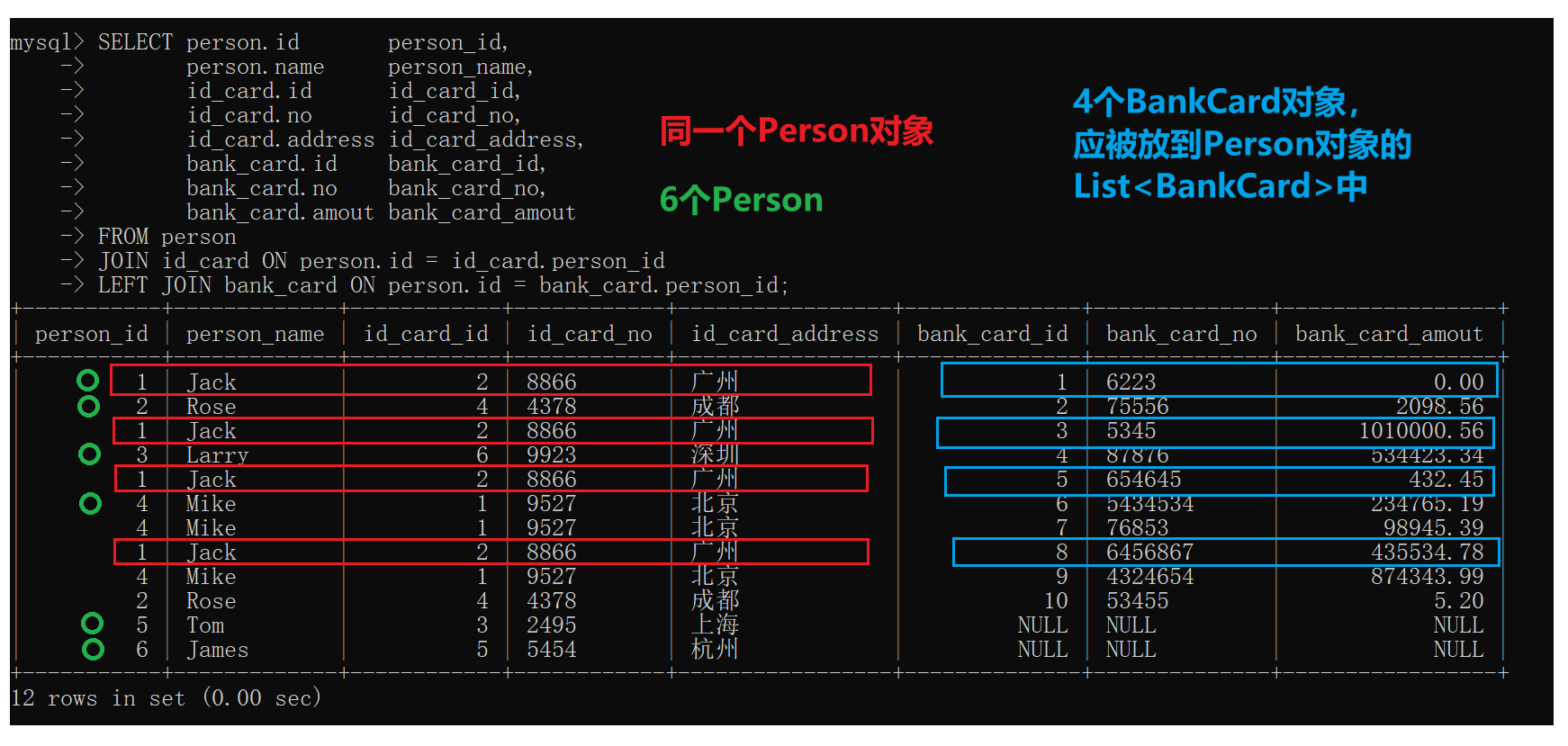
<mapper namespace="person">
<sql id="sqlListAll">
SELECT person.id person_id,
person.name person_name,
id_card.id id_card_id,
id_card.no id_card_no,
id_card.address id_card_address,
bank_card.id bank_card_id,
bank_card.no bank_card_no,
bank_card.amout bank_card_amout
FROM person
JOIN id_card ON person.id = id_card.person_id <!-- Everyone has an ID card JOIN -->
LEFT JOIN bank_card ON person.id = bank_card.person_id <!-- Everyone doesn't necessarily have a bank card LEFT JOIN -->
</sql>
<resultMap id="rmList" type="Person">
<id property="id" column="person_id"/>
<result property="name" column="person_name"/>
<association property="idCard" javaType="IdCard">
<id property="id" column="id_card_id"/>
<result property="no" column="id_card_no"/>
<result property="address" column="id_card_address"/>
</association>
<collection property="bankCards" ofType="BankCard">
<id property="id" column="bank_card_id"/>
<result property="no" column="bank_card_no"/>
<result property="amout" column="bank_card_amout"/>
</collection>
</resultMap>
<select id="list" resultMap="rmList">
<include refid="sqlListAll"/>
</select>
<select id="get" resultMap="rmList">
<include refid="sqlListAll"/> WHERE person.id = #{id}
</select>
</mapper>
public static void main(String[] args) {
try (SqlSession session = MyBatises.openSession()) {
List<Person> lists = session.selectList("person.list");
Person person = session.selectOne("person.get", 1);
System.out.println(lists);
System.out.println(person);
}
}
N to n
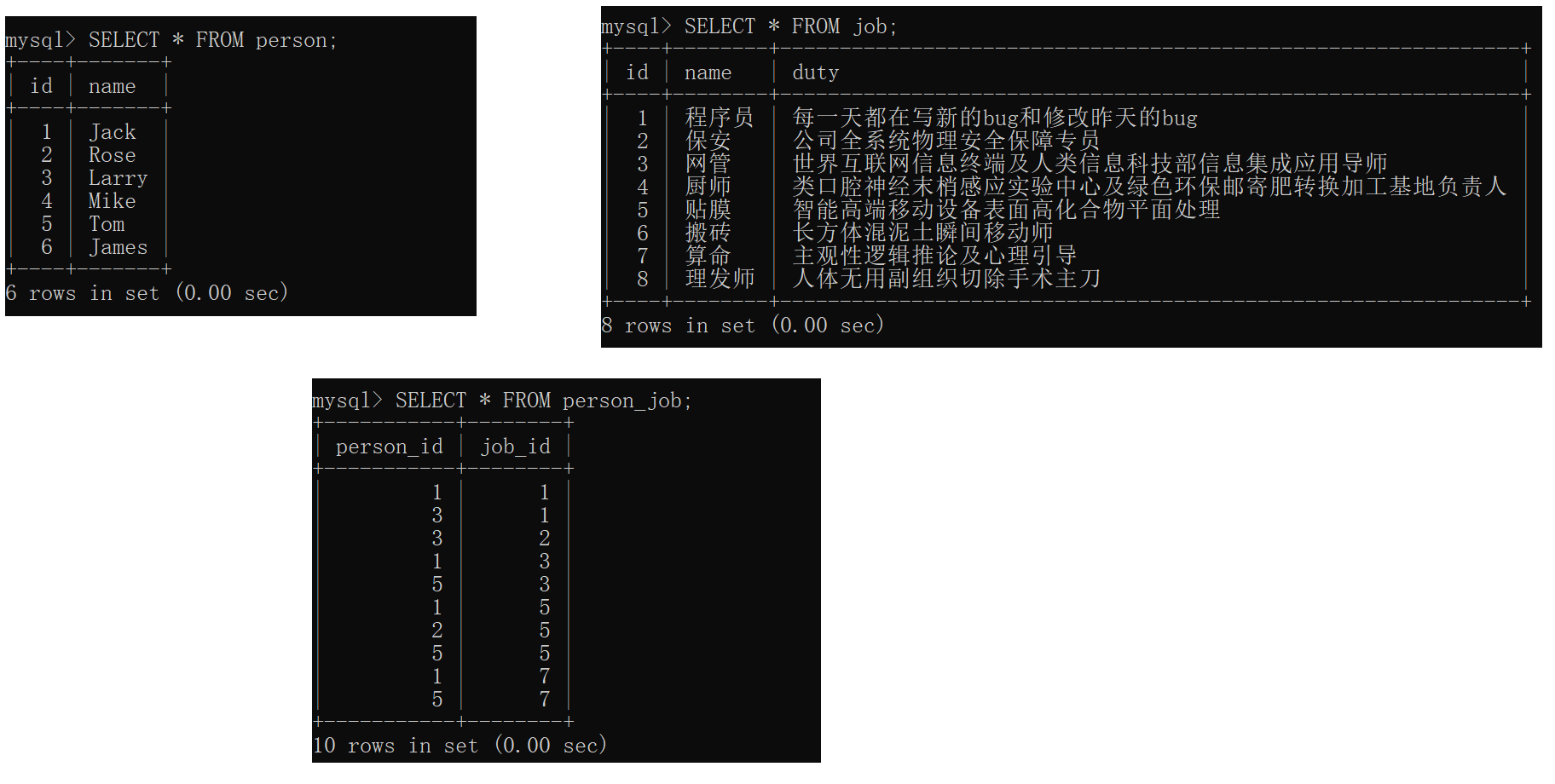
Query Job:
<mapper namespace="job">
<sql id="sqlListAll">
SELECT job.id job_id,
job.name job_name,
job.duty job_duty,
person.id person_id,
person.name person_name
FROM job
LEFT JOIN person_job ON job.id = person_job.job_id
LEFT JOIN person ON person.id = person_job.person_id
</sql>
<resultMap id="rmJob" type="Job">
<id property="id" column="job_id"/>
<result property="name" column="job_name"/>
<result property="duty" column="job_duty"/>
<collection property="persons" ofType="Person">
<id property="id" column="person_id"/>
<result property="name" column="person_name"/>
</collection>
</resultMap>
<select id="list" resultMap="rmJob">
<include refid="sqlListAll"/>
</select>
<select id="get" parameterType="Int" resultMap="rmJob">
<include refid="sqlListAll"/> WHERE job.id = #{id}
</select>
</mapper>
public static void main(String[] args) {
try (SqlSession session = MyBatises.openSession()) {
List<Job> lists = session.selectList("job.list");
Job job = session.selectOne("job.get", 1);
System.out.println(lists);
System.out.println(job);
}
}
Query Person:
<mapper namespace="person">
<sql id="sqlListAll">
SELECT person.id person_id,
person.name person_name,
id_card.id id_card_id,
id_card.no id_card_no,
id_card.address id_card_address,
bank_card.id bank_card_id,
bank_card.no bank_card_no,
bank_card.amout bank_card_amout,
job.id job_id,
job.name job_name,
job.duty job_duty
FROM person
JOIN id_card ON person.id = id_card.person_id
LEFT JOIN bank_card ON person.id = bank_card.person_id
LEFT JOIN person_job ON person.id = person_job.person_id
LEFT JOIN job ON job.id = person_job.job_id
</sql>
<resultMap id="rmList" type="Person">
<id property="id" column="person_id"/>
<result property="name" column="person_name"/>
<association property="idCard" javaType="IdCard">
<id property="id" column="id_card_id"/>
<result property="no" column="id_card_no"/>
<result property="address" column="id_card_address"/>
</association>
<collection property="bankCards" ofType="BankCard">
<id property="id" column="bank_card_id"/>
<result property="no" column="bank_card_no"/>
<result property="amout" column="bank_card_amout"/>
</collection>
<collection property="jobs" ofType="Job">
<id property="id" column="job_id"/>
<result property="name" column="job_name"/>
<result property="duty" column="job_duty"/>
</collection>
</resultMap>
<select id="list" resultMap="rmList">
<include refid="sqlListAll"/>
</select>
<select id="get" resultMap="rmList">
<include refid="sqlListAll"/> WHERE person.id = #{id}
</select>
</mapper>
public static void main(String[] args) {
try (SqlSession session = MyBatises.openSession()) {
List<Person> lists = session.selectList("person.list");
Person person = session.selectOne("person.get", 3);
System.out.println(lists);
System.out.println(person);
}
}
Notes and some suggestions
- The resultMap tag uses type
- The association tag uses javaType
- The collection tag uses ofType
- review
- A JOIN is an INNER JOIN
- LEFT JOIN is LEFT OUTER JOIN
- RIGHT JOIN is RIGHT OUTER JOIN
-
When using the association tag, the mapping relationship between all database fields and JavaBean properties should be written in the resultMap tag.
-
Query details
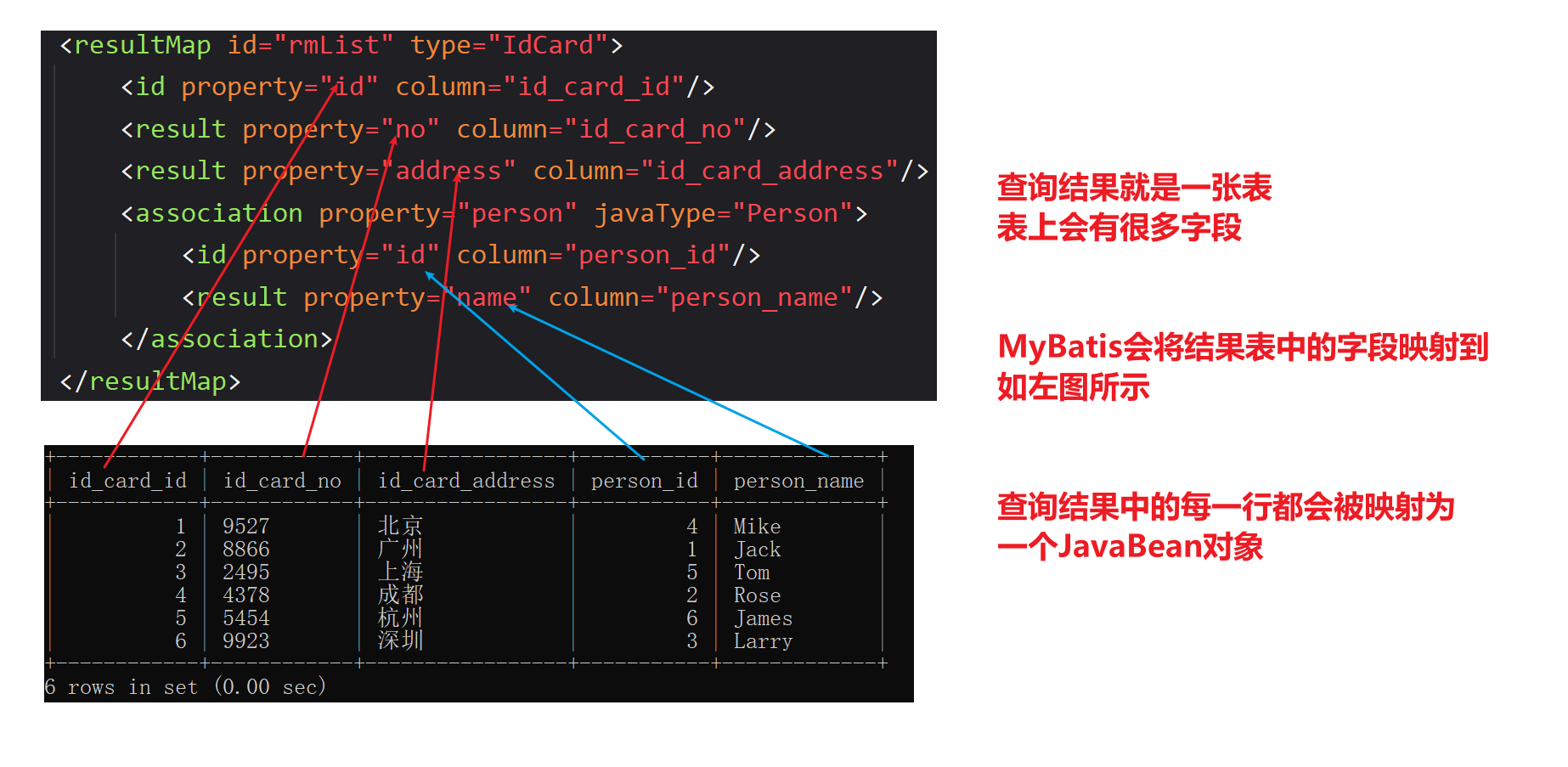
-
The above query code can also be mapped in the way mentioned earlier:
- Mode 1:
<mapper namespace="id_card"> <sql id="sqlListAll"> SELECT id_card.id id_card_id, id_card.no id_card_no, id_card.address id_card_address, person.id person_id, person.name person_name FROM id_card JOIN person ON id_card.person_id = person.id </sql> <resultMap id="rmList" type="IdCard"> <id property="id" column="id_card_id"/> <result property="no" column="id_card_no"/> <result property="address" column="id_card_address"/> <result property="person.id" column="person_id"/> <result property="person.name" column="person_name"/> </resultMap> <select id="list" resultMap="rmList"> <include refid="sqlListAll"/> </select> <select id="get" resultMap="rmList"> <include refid="sqlListAll"/> WHERE id_card.id = #{id} </select> </mapper>- Mode 2:
<mapper namespace="id_card"> <sql id="sqlListAll"> SELECT id_card.id id, id_card.no no, id_card.address address, person.id `person.id`, person.name `person.name` FROM id_card JOIN person ON id_card.person_id = person.id </sql> <select id="list" resultType="IdCard"> <include refid="sqlListAll"/> </select> <select id="get" resultType="IdCard"> <include refid="sqlListAll"/> WHERE id_card.id = #{id} </select> </mapper>
-
When writing query statements, it is best not to use SELECT *, Because of poor performance and efficiency.
-
When using MyBatis, when writing query statements, use id tags to improve the query performance of MyBatis
-
In actual development, FLOAT and DOUBLE are not recommended for the amount in the database table, but DECIMAL is recommended.
-
Example: DECIMAL(18, 2): 18 significant digits (including decimal point), with 2 decimal places reserved.
-
Or using BIGINT, the unit of storage is not yuan, but minute.
-
In other words, a dollar will be stored as 100 points; In other words, 16.89 yuan will be stored as 1689 points;.
reference resources
Xiaomaige - Li Mingjie: Java from 0 to architect ③ advanced Internet architect.
At the end of this article, thank you for your attention and support!